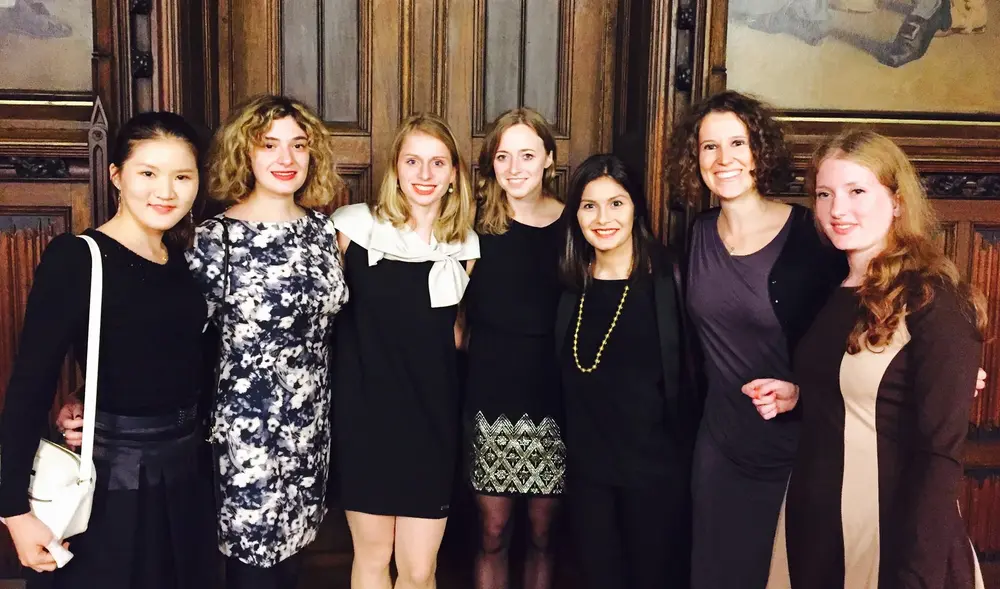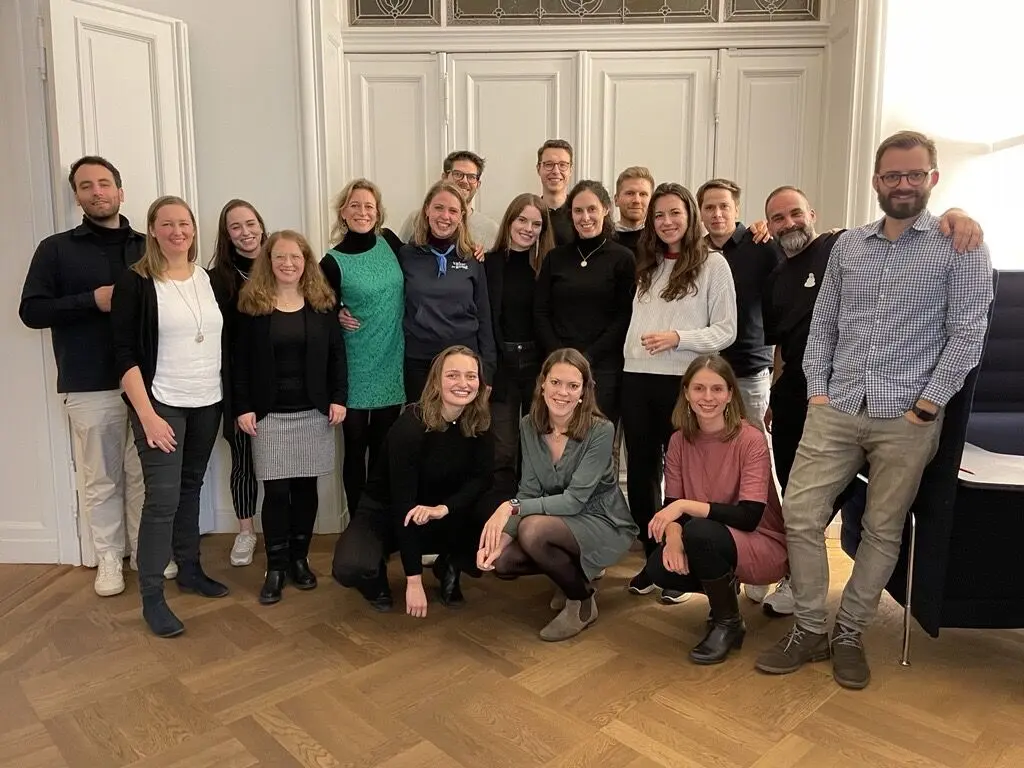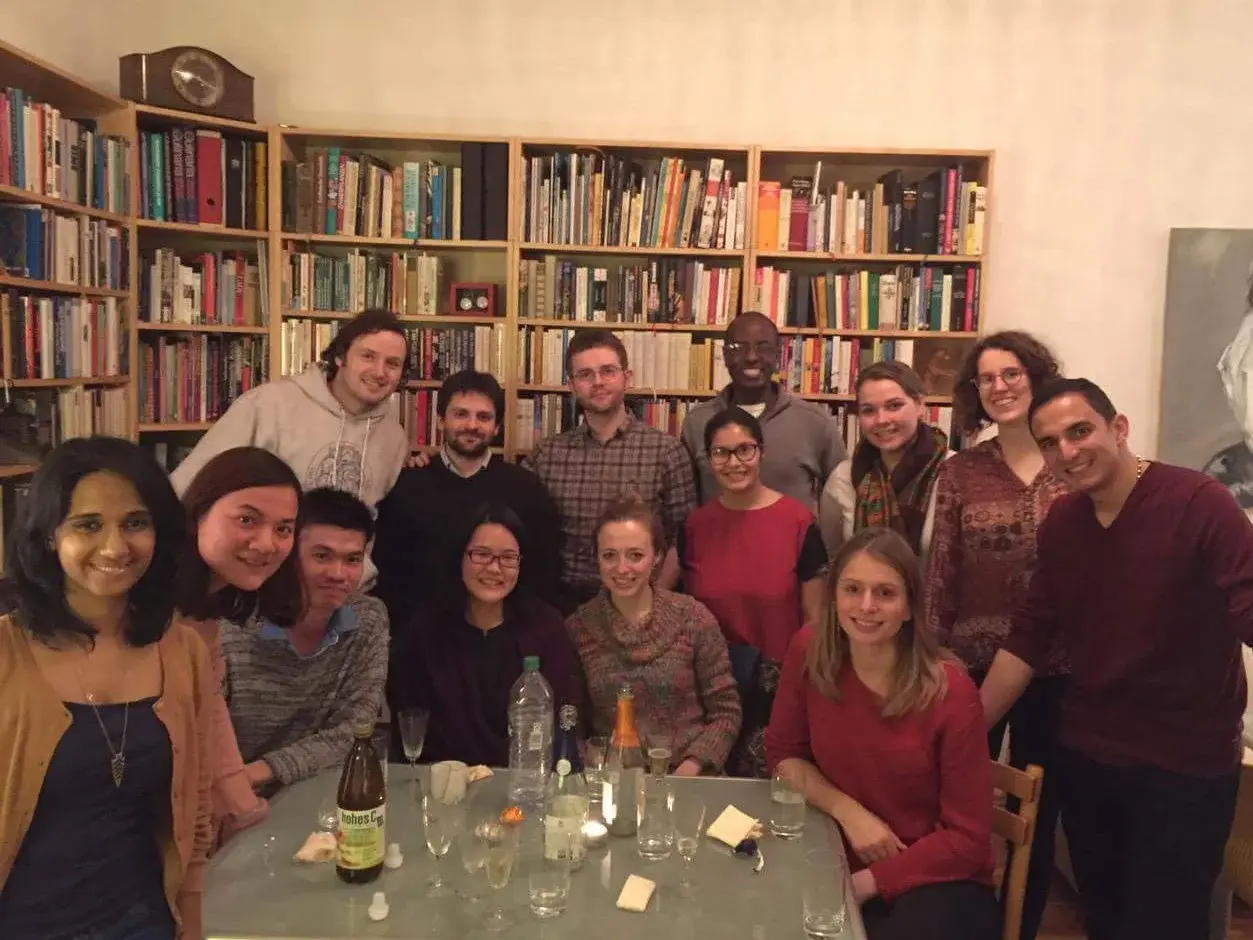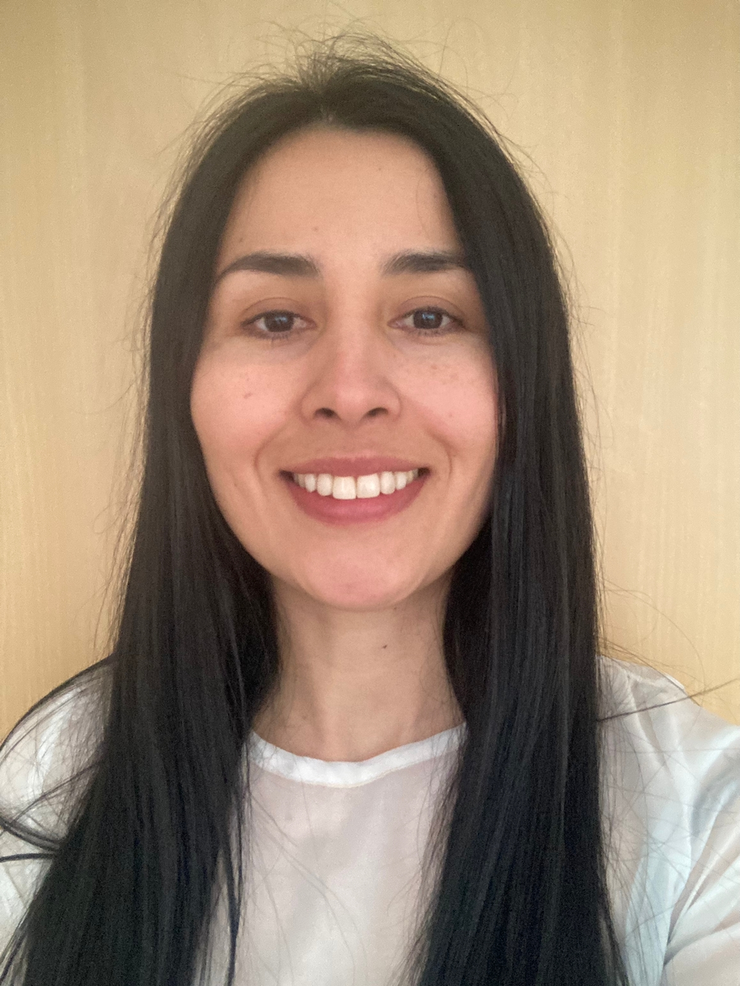The Bulletin interview with alumna: Theresa Hannes

Theresa Hannes with her classmates at the WBS Welcome reception.
Theresa Hannes is a 2018 graduate of the Willy Brandt School, currently working as a Senior Consultant at the social impact consultancy Value for Good GmbH. She has previous experiences in consulting, international organizations (e.g. UNICEF), NGOs and more. She is particularly passionate about social entrepreneurship, international development cooperation and gender equality.
In this interview, she shares more about her job and how Willy Brandt School helped her get equipped for the position, as well as some tips and tricks to the path of landing an amazing career.
Thanks so much for joining us! Could you tell us about your motivations to pursue a career in the policy space?
It has started from an intrinsic motivation to better understand how the world works, and how the different stakeholders, institutions and organizations are connected. This is at least a good start to knowing what I can do to contribute to positively changing the world. So, it has been this idea about being a change maker or at least contributing to some extent.
What are some pivotal decisions or opportunities that have led you to your current position?
Looking back, something I might not have done consciously, but I recommend everyone to do, is to think strategically about their career.
This includes thinking about what you are going to do after the master, where you want to go, what you need to get there, how can you get there, and what potential you have to get there. What I realized is that public policy and social sciences are quite competitive fields, so if you graduate you have thousands of people that have similar skills and want the same career. It is therefore really difficult to enter the job market, especially if you don’t have any long-term professional experience (like in my case). Luckily, I received the advice to approach my professional pathway strategically while I was studying and doing my internship at UNICEF.
What struck me during this internship was that my direct supervisor, who was in her late 30s, came to her position very organically by entering a junior position and then gradually climbing up the hierarchy. At the same time, I also came in contact with someone in his early 30s who transferred from an external company and entered UNICEF in a quite high-level position.
I thought about what he did differently. That’s when I first heard about management consulting. While it is well known in the field of economics and business administration, as a public policy student I was less familiar with this path.
He advised me to try consulting first, because it can offer you a lot of opportunities in a short amount of time. I gave this a try, and I started preparing for consulting applications, which was also a different challenge. It is very different to what you learn in university, but I took sufficient time to prepare, went through some interviews and luckily it worked out with Boston Consulting Group (BCG), so I started my career there. It was great because they offered me a unique learning opportunity and I met really smart people from all around the world. I felt appreciated financially which I think is important because we can get stuck being idealistic but at the same time it does not mean that you have to do everything for free as you also work hard for it.
The consultancy has been a really good experience, but it is also a very hardworking culture. It was very challenging, but I am glad that I did it because through BCG I met my current manager. She used to work at BCG and we had an Alumni event where we met, she shared her journey about the founding process of her current company. That is how I got to know Value for Good. After a year in BCG, I decided to apply for a position at Value for Good and it worked out. This was now almost three years ago. I am really happy it worked out this way, but I think it wouldn’t have been possible without my start in the private sector.
You are currently employed as a Social Impact Senior Consultant at Value for Good. Would you please explain the main duty of the position?
Value for Good is a strategic management social impact consulting company. You can think of it as a boutique consulting firm focused only on social impact and sustainability topics. We work with clients across all sectors (private, public, international organizations, NGOs) along the three themes “advising” (e.g. developing strategies, building new programmes, etc.), “empowering” (e.g. providing training on certain topics such as impact management) and “inspiring” (e.g. writing studies like our latest publication on “Gaming and the Metaverse – The alarming rise of online sexual exploitation and abuse of children within the new digital frontier”).
I recently worked on three projects. One project is with a large international foundation that established a new fellowship postgraduate program to offer scholarships for the next future STEM leaders (science, technology, engineering, mathematics). We supported building this programme from scratch, from outreach to the selection process, and they just announced the first cohort in the White House.
Another program is from a foundation to empower Black women across the world. We helped them to collect ideas and develop a concept that later will be submitted to the board and hopefully get these programs started. I have enjoyed being involved in this project supporting female leadership. I am very passionate about intersectional work and being part of this is a privilege.
The third one is Value for Good’s impact management flagship program. It is an acceleration program for social organizations to build their impact management skills. We coach them for a year and help them to develop or refine their impact strategy (including a theory of change), an impact measurement plan (including KPIs) and advise how they can implement and communicate their impact approaches.
To close this with a positive note, the impact sector and purpose-driven jobs are growing overall, which is of great potential for Willy Brandt School students.

Theresa Hannes and her colleagues work with clients across all sectors at the social impact consultancy Value for Good GmbH.
What are the skills you have learned in the Brandt School that helped you the most throughout your career?
The school offers a broad range of contents and methods, and the information you receive depends on which area you choose as a specialization.
Firstly, I gained new skills by working in diverse groups and considering diverse perspectives. WBS students work in groups for many assignments which are not always easy. A piece of advice here would be to write down your experiences as you go in preparation for when you graduate and start applications and interviews. Many interviewers like to ask about team situations.
Secondly, I also strengthened my analytical skills as I learned to make connections between theoretical concepts and practical implications. In the programme, you have to absorb a lot of content very quickly.
Lastly, I got the chance to improve my professional English. I remember in my first semester at WBS, I was so nervous because I had to present in English. I rehearsed 20 times before presenting. Now I no longer think about it when I write, discuss or present in English because it comes so naturally.
What would you have done more/focused more on if you were to go back to your Brandt School years?
I reflected on the question with fellow WBS alumni and came up with three points.
The first point is to network. It is a very unique opportunity since there is nothing to lose. I am not a natural-networking person and it makes me a little bit uncomfortable. At the same time, it is something that the more often you do it, the easier it gets, and there are plenty of opportunities at WBS, not just in the student community but also with professors, guest speakers, local policymakers, and entrepreneurs. Everyone is usually very open to exchanging and connecting. It is easier than ever before with platforms like LinkedIn. After an event, you can send a request and say “it was wonderful to see you speak today” and stay connected. There is a lot the alumni community has to offer, so it is great the Bulletin has reached out for alumni interviews. People you reach out to can help you with what you want to achieve with your career, or know someone who can help further. A lot can be gained through networking. I get a lot of messages from people who ask me about my job and what is needed to get in.
The second point is to find opportunities to learn, not just in class but beyond. For instance, you are conducting an interview right now, which is something you might have to do in your job. WBS offers many opportunities, even new ones since I graduated, such as the Bulletin. Find activities that help you experiment with what suits you, and what type of work you like. The university has so many opportunities, so it is about finding courage. It is a great space to try things out without high stakes involved. There are many free offerings like language courses that would have a cost later in life. It is good to find someone, maybe a professor, to provide specific feedback. Be open about it and ask “could you provide with me feedback on what I did well and what I could do better?” It should not discourage you but will help you grow a lot. I received a lot of feedback in my work life that I wished I had heard during my university years. It is the small things that make a huge difference.
Lastly, enjoy Erfurt! It is a small city but it has beautiful surroundings and beautiful nature. You can explore a lot in the city, and there are a lot of cultural offerings. Do it and enjoy the student time you have.

Theresa Hannes still keeps contact with her batch, and encourages Brandtians to network, find opportunities to learn and enjoy Erfurt!
Seeing consultancy has more of a commercial background, how do we use our social science background to prepare ourselves to enter consultancy positions?
Consultancy is definitely not the only way to do it (“just because it worked for me, does not mean it needs to work for you”), and there are a lot of downsides. The culture and the pressure of the job are tough. It is a good way but not the only way. However, if you are interested in consulting, there are a lot of really good resources out there. There are 2 parts of the interview including the generic one with questions like “when did you have a (team) conflict and how did you resolve it,” and another part is a case, for instance, planned market expansion, the introduction of a new product, reduction of cost, and using money most effectively. There is a website called Bridgespan with social impact consulting cases online, and PrepLounge where you can connect with other people. Also, for me, it is key to practice interviews with someone else, where you start with an assumption, and someone else is giving you more information, like a ping-pong process! I did it with someone in WBS and it went terribly. It made me realize I needed to practice more and found people online, since there are thousands of people also preparing for this interview and wanting to practice as well. We met 2-3 times a week, each of us preparing one case and I did this for 3 months. We covered 30-40 cases. It was really key, since how you go about these cases is different from how you go about other tasks in the university.
Another tip is to apply to as many companies as possible, start interviewing companies that you like the least and keep the interviews of companies you want the most as the last ones as you will gain more practice and experience.
What would be your next step in your career planning?
The consultancy industry has a very strong reputation. You usually have a lot of opportunities available when you work in a consultancy, including public service work (e.g. transferring to a ministry), working in a foundation or becoming a social entrepreneur yourself.
I can confidently say that in the past 3-5 years I have developed very strong skills in many different contexts and built my networks since I connect to organizations all the time.
For now, I am happy at Value for Good and will focus on my career steps internally. My next role at Value for Good will be project leader which is a really exciting transition, because it is an official shift from “just being responsible for yourself” to leading and coaching other people: your project and client teams.
Was it more difficult for internationals to get opportunities in Germany?
It depends on the areas you focus on. In many companies, it is very beneficial if you speak German. However, it is great to have a strategic plan to set a goal on where the best place is to achieve what you would like to achieve. This involves thinking about if you want to go back to your country and what set of skills and knowledge are required. It is helpful to get a good start, like finding a solid entry point. For instance, doing a fellowship, getting some work experience, and then after some experience, it is easier to continue to find more opportunities in your chosen field.
Thank you so much for spending time with us! We learned a lot!
(Photos Credit: Theresa Hannes)

About the interviewers
Nancy Apraez is a first-year student at the Willy Brandt School. She has a Bachelor’s Degree in Law and has worked in the legislative branch in Colombia. She is interested in Conflict Studies and Development.

Neha Singh is a first-year student at the Willy Brandt School. She has a background in knowledge and community management, environment, digitalization, marketing, and partnership development. She is passionate about environmental topics, conflicts and human rights.
~ The views represented in this blog post do not necessarily represent those of the Brandt School. ~